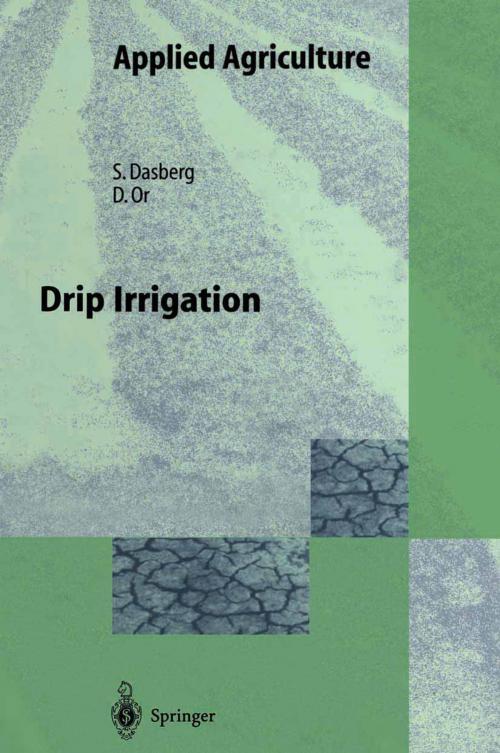| Author: | Samuel Dasberg, Dani Or | ISBN: | 9783662039632 |
| Publisher: | Springer Berlin Heidelberg | Publication: | April 17, 2013 |
| Imprint: | Springer | Language: | English |
| Author: | Samuel Dasberg, Dani Or |
| ISBN: | 9783662039632 |
| Publisher: | Springer Berlin Heidelberg |
| Publication: | April 17, 2013 |
| Imprint: | Springer |
| Language: | English |
The aim of this book is quite ambitious: here, we attempt to bridge the gap between soH physicists, agronomists, horticulturists, hydraulic engineers, de signers, manufacturers and users of drip irrigation systems. We believe that progress in drip irrigation hinges on the contributions of professionals made in all related disciplines and their cooperation. The last decade has seen great development in the field of drip irrigation, al though the drip-irrigated area has not increased at the same rate as in the pre vious decade. However, our understanding of the processes involved in water and solute distribution and in plant response has increased vastly. The tools for op timal design of drip systems have improved tremendously. The main progress has been in the development and in the manufacture of sophisticated equipment; not only improved types of emitters and laterals, but also auxiliary equipment such as new filtration systems, controllers and sensors. In this book we highlight the need to maintain a proper balance between the hydraulic design of drip systems and aspects of their management and maintenance. Drip irrigation has a potential for high water use efficiency, but many well-designed systems suffer from bad management. We are indebted to the late Eshel Bresler for his contribution to our under standing of water and solute movement under drip irrigation and its appli cation to system design. Some parts of a previous publication entitled "Drip irrigation manual" authored by S. Dasberg and E.
The aim of this book is quite ambitious: here, we attempt to bridge the gap between soH physicists, agronomists, horticulturists, hydraulic engineers, de signers, manufacturers and users of drip irrigation systems. We believe that progress in drip irrigation hinges on the contributions of professionals made in all related disciplines and their cooperation. The last decade has seen great development in the field of drip irrigation, al though the drip-irrigated area has not increased at the same rate as in the pre vious decade. However, our understanding of the processes involved in water and solute distribution and in plant response has increased vastly. The tools for op timal design of drip systems have improved tremendously. The main progress has been in the development and in the manufacture of sophisticated equipment; not only improved types of emitters and laterals, but also auxiliary equipment such as new filtration systems, controllers and sensors. In this book we highlight the need to maintain a proper balance between the hydraulic design of drip systems and aspects of their management and maintenance. Drip irrigation has a potential for high water use efficiency, but many well-designed systems suffer from bad management. We are indebted to the late Eshel Bresler for his contribution to our under standing of water and solute movement under drip irrigation and its appli cation to system design. Some parts of a previous publication entitled "Drip irrigation manual" authored by S. Dasberg and E.















